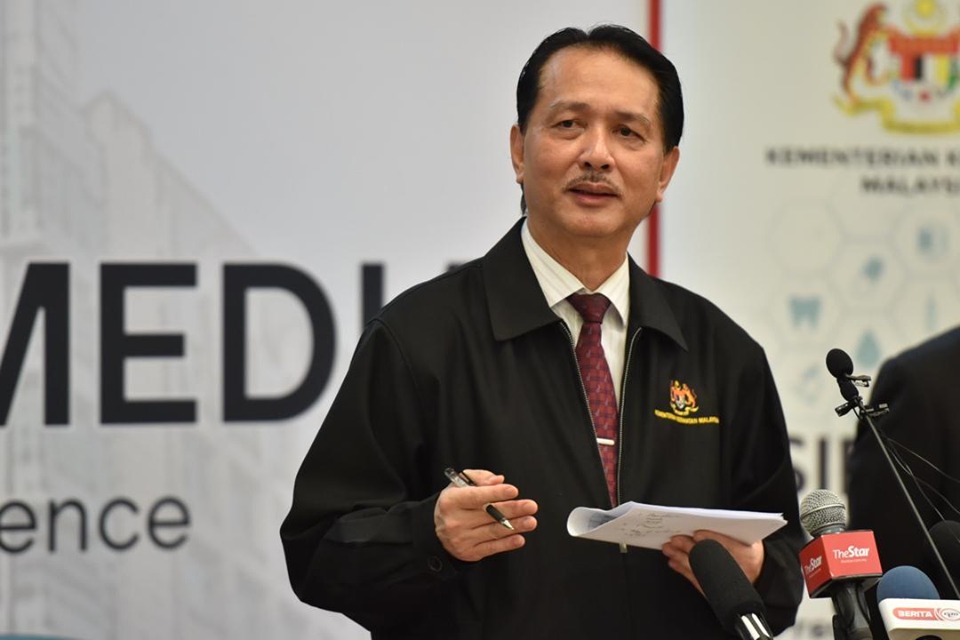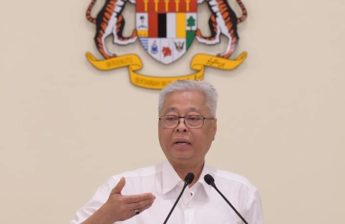KUALA LUMPUR, Oct 15 — The Institute of Medical Research (IMR) believes that the D614G strain of the coronavirus in the Benteng LD cluster in Sabah likely came from the neighbouring Philippines or Indonesia.
Health director-general Dr Noor Hisham Abdullah said the IMR had compared 23 samples from Sabah’s Benteng LD cluster against the Sivagangga, Tawar, and Sungai clusters in Kedah and found different traits between the Benteng LD cluster and the latter three clusters, despite both being of the same D614G strain that is purportedly more contagious.
“We find that the D614G strain from Sabah could have come from the Philippines or Indonesia.
“Now, there are 23 new clusters involving 604 individuals from Sabah who tested positive for Covid-19, with a huge likelihood that they carry the D614G strain,” Dr Noor Hisham told a virtual press conference today.
The Health DG said last month that IMR’s genome analysis showed that the coronavirus from the Benteng LD cluster in Sabah was not related to the strains found in Kedah.
Veteran physician Dr Milton Lum previously wrote that lab studies suggested, but did not prove, that the D614G strain was more infectious in humans than other strains. He also said the D614G variant of the SARS-CoV-2 virus is currently the predominant strain globally and has been found in many countries, like Singapore and in Europe, since last February.
Dr Noor Hisham also said today that the public health care system in Selangor still has capacity to treat Covid-19 cases, pointing out that 406 beds have been reserved at the National Leprosy Control Centre in Sungai Buloh Hospital, Malaysia’s main Covid-19 hospital, for coronavirus-infected people with no or mild symptoms.
“Maybe we’ll look at building a temporary hospital at MAEPS (Malaysia Agro Exposition Park Serdang), but as of now, we have no such plans because we still have capacity to treat cases,” he said, when asked if MAEPS would be reopened after it was previously used from April to July to treat and quarantine low-risk Covid-19 cases.
Despite the Ministry of Health’s (MOH) admission today that the Selangor health care system has sufficient capacity, the entire Klang Valley — comprising Selangor, Kuala Lumpur, and Putrajaya — was placed under a two-week Conditional Movement Control Order (CMCO) from October 14 to 27. The movement restrictions generally prohibit people from travelling between borders in the Klang Valley unless for work purposes or to buy necessities.
Public health experts have generally advocated lockdowns only to slow the transmission of Covid-19 enough to allow health care systems to build up capacity. The special envoy of the World Health Organization’s (WHO) director-general on Covid-19, Dr David Nabarro, recently called for a “middle path” in battling the pandemic, pointing out that too many restrictions damaged people’s livelihoods. He stressed that building the capability of public health capacity was not the same as implementing lockdowns, as lockdowns merely freeze the virus, but do not eliminate it.
Main Covid-19 Highlights
MOH reported 589 new Covid-19 cases nationwide today, including 586 local transmissions, with 51.6 per cent of them, or 304 cases, coming from Sabah. A total of 91 cases (15.4 per cent) came from the Tembok cluster, the Penjara Reman cluster, and the Seberang Perai Prison cluster, all of which are isolated in prisons.
The Klang Valley comprised 27.2 per cent of today’s cases: Selangor (150 cases), Kuala Lumpur (nine cases), and Putrajaya (one case).
Three Covid-19 fatalities were reported today, all in Sabah, the eighth consecutive day of coronavirus-related deaths recorded in the country that were all found in the East Malaysian state. One of the victims reported today was a 100-year-old foreign woman in Sandakan, the oldest Covid-19 fatality in Malaysia. Malaysia’s youngest fatality was a one-year-old baby girl.
Four new Covid-19 clusters were reported today: one in Sabah — the Olive cluster covering Hulu Langat in Selangor; and Kota Marudu and Penampang in Sabah; with a total of 17 Covid-19 cases. The index case (Patient 11,489) was discovered in Selangor in a screening of returnees from Sabah.
Another cluster — the Bah Pasir cluster — was found across Port Dickson in Negri Sembilan and Putrajaya, with a total of five positive cases. The index case also had Sabah travel history.
The new Bah Pengkalan cluster — whose two index cases returned from Sabah — reported six positive cases in Hulu Perak, Perak.
Labuan reported a new cluster, the Saguking cluster, with five positive cases. The index case was identified in a screening of admissions to Labuan Hospital.
MOH also reported an additional 105 cases in the Utama cluster — which has spread across the Gombak, Petaling, and Hulu Langat districts in Selangor, as well as Alor Gajah, Melaka — totalling 132 cases so far. One of the 132 cases was reported in Melaka, with the rest in Selangor.
MOH also clarified that the index case for the Utama cluster (Patient 15,023) was a 28-year-old Nepali security guard at a shopping centre in the Petaling district, who started experiencing fever, cough, and cold since September 22. He was only detected with coronavirus 16 days later on October 8 through a screening of close contacts.
“Previously, MOH suspected Patient 12,549 as the index case, but further investigations show that the person’s symptoms started later than Patient 15,023”.
MOH announced on October 10 the emergence of the Utama cluster, with 10 positive cases then, naming Patient 12,549 as the index case who was discovered through a symptomatic screening on October 4.
The 1 Utama Shopping Centre management said in a statement earlier today that it was misleading for the Petaling District Disaster Management Committee (JPBD) to imply that 63 Covid-19 cases originated from the mall. The government committee had called it a “One Utama Shopping Centre Complex Cluster”, despite the federal MOH simply naming it Utama cluster, in line with its practice of not naming clusters after the place of origin where index cases were discovered.
1 Utama management stressed that its own initiative of testing 6,000 mall and tenant staff from October 11 to 12 only yielded 21 positive cases, or a 0.35 per cent positivity rate.
The Petaling Jaya shopping centre said after MOH informed it about a security guard testing positive through health authorities’ screening, 1 Utama removed all guards under his company for re-testing and only planned to redeploy them after they clear tests, despite having been tested before when they were first assigned to work.
“With 13 malls in Klang Valley already reporting Covid cases, 1 Utama is the first and only mall to risk it all and conduct a mass test of such scale to go beyond our call of duty. The maxim of ‘test more know more, no test no case’ rings true.”
The Petaling JPBD said in its October 14 statement that 44 of the 63 cases in the purported 1 Utama cluster were security guards.








